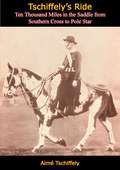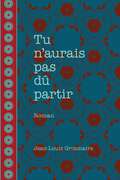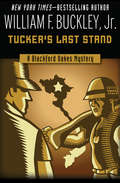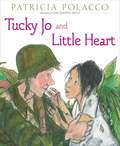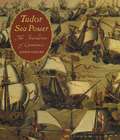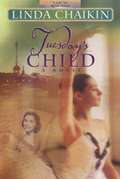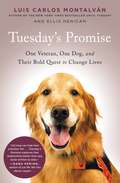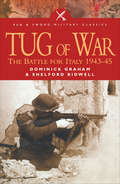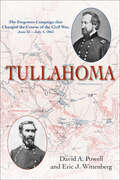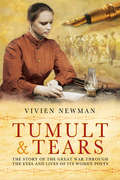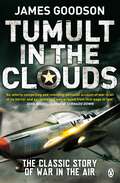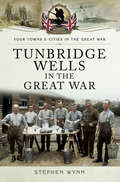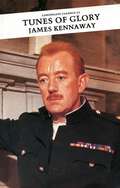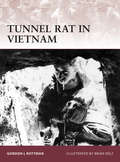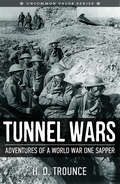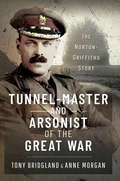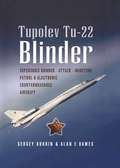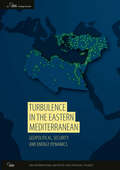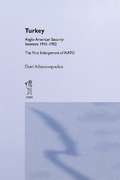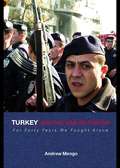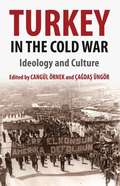- Table View
- List View
Tschiffely’s Ride: Ten Thousand Miles in the Saddle from Southern Cross to Pole Star
by Aimé TschiffelyTHE UNDISPUTED CLASSIC OF EQUINE ADVENTUREIn the early 1920s, a peaceful Swiss schoolteacher accomplished one of the most extraordinary equestrian journeys in history: Aimé Tschiffely and his two trusty steeds, Mancha and Gato, traveled the incredible distance of ten thousand miles between Buenos Aires and New York.Tschiffely’s Ride recounts the dramatic story of that daring journey. Along the trackless Pampas of Argentina, over Peru’s towering Andes Mountains, through the malaria infested jungles of Central America, across the deserts of Mexico, and on to a rapturous welcome in faraway New York, Tschiffely carries the reader along on an unforgettable quest.Although many taunted him as a fool for daring to make a ride that had never been attempted, the author was greeted as a hero by the president of the United States and given a ticker tape parade by the mayor of New York City. Nearly a century later, the modest Tschiffely is revered as the most influential Long Rider in history.Tschiffely’s journey has inspired five generations to swing into the saddle and seek their own equestrian adventure; his beloved book remains the most famous and enduring equestrian travel tale ever written.“It is a fascinating personal narrative....Tschiffely has told a romantic and adventurous tale.”—Kirkus Reviews“A ride that beats all the great rides of fact and fiction clean out of the field.”—The Times
Tu cabello es la frontera
by J. Jesús EsquivelUna novela basada en hechos reales que retrata con intensidad la vida en la frontera norte del país, ese otro México dentro de México que vive al filo de la navaja y en el que la línea que separa la legalidad de la ilegalidad es tan porosa como aquella que divide a un país del otro. Carolina es una joven atractiva de Ciudad Juárez. La vida parece sonreírle: el negocio familiar es próspero, sus hermanos mayores la adoran y protegen, y, a su corta edad, comienza a ser el objeto de atracción de todas las miradas masculinas juarenses -y esto, claramente, no le molesta-. Mientras la vida en la ciudad se ve trastocada por la violencia, el narcotráfico y la corrupción, Carolina parece habitar una realidad paralela, entre la candidez y el cinismo. Vicente es un periodista que comienza su carrera en un diario de la capital del país. Gracias a su dedicación y su valor para exhibir a funcionarios públicos, es asignado a una misión importante: cubrir la guerra contra el narcotráfico, del presidente Enrique Calderón Nieto, en el norte del país. Al poco tiempo de iniciar su investigación, descubre que el asunto es mucho más grave que una sangrienta disputa entre bandas rivales de criminales y que la red de complicidades y corrupción alcanza al procurador de justicia y al gobernador del estado. ¿Qué pasará cuando los caminos de estos dos personajes -Carolina y Vicente- se crucen? Mezcla magistral de thriller político y novela costumbrista, Tu cabello es la frontera es el retrato fiel de la descomposición política de un país y, al mismo tiempo, el retrato entrañable del día a día de millones de mexicanos que viven, en todos los sentidos, sobre la raya.
Tu n'aurais pas dû partir
by Monsieur Jean-Louis Grosmaire1914. Louison retrouve, dans un tiroir, une lettre qu’elle n’a jamais envoyée à son amie d’enfance restée en Franche-Comté... Son monde bascule, à l’image du monde autour d’elle, car la guerre gronde dans les anciens pays. Tu n’aurais pas dû partir est la suite du roman L’homme qui regardait vers l’ouest, qui raconte le départ de Paul et de sa fille Louison vers l’Amérique et leurs premières années en terre canadienne.Paul, le père de Louison, s’enrôle dans l’Armée canadienne pour sauver sa France natale. Madeleine, son épouse, devra élever seule les deux jeunes enfants depuis leur demeure à Hull.Et voilà que Louison et son ami de cœur James, un Sino-Canadien, s’engagent à leur tour dans la guerre.Dans ce troisième tome de la Saga Javelier, Grosmaire explore la vie des soldats canadiens, africains, des ressortissants chinois en France et au Canada.Prix Louis-Pergaud 2007Formats disponibles : broché et numérique (PDF et ePub accessibles)
Tucker's Last Stand (Blackford Oakes #9)
by William F. Buckley Jr.The year is 1964. Faced with a tough presidential campaign and a deteriorating situation in Vietnam, Lyndon Johnson dispatches super agent Blackford Oakes on a mission to Southeast Asia. With him goes Tucker Montana, a character as colorful as his background is shady. They have two goals: Tucker to plot interdiction on the Ho Chi Minh Trail, Oakes to oversee a secret operation in the Tonkin Gulf -- an operation that will give Johnson the excuse he needs for a greater U.S. military role in Vietnam.
Tucker's Last Stand (The Blackford Oakes Mysteries #9)
by William F. Buckley Jr.The year is 1964. Lyndon Baines Johnson and Barry Goldwater are vying for the presidency, and CIA master spy Blackford Oakes has been sent to South Vietnam to halt its infiltration by men and materiel coming down the Ho Chi Minh Trail. Working out of Saigon with Tucker Montana, a shadowy Texan who designs a brilliant system for breaking the North's supply route, Blackford Oakes is caught up in the ambiguity and confusion generated as America's involvement in the conflict escalates. As Tucker's murky past, his torrid romance with the seductive Lao Dai, and the growing menace of global war come into focus, Oakes--and Tucker--find their loyalty called into question. Both men are forced to make a decisive move that will have consequences neither man can foresee.
Tucky Jo and Little Heart
by Patricia PolaccoFriendship, loyalty, and kindness stand the test of time in this heartwarming World War II–era picture book based on a true story from the beloved author-illustrator of Pink and Say and The Keeping Quilt. <P><P>Tucky Jo was known as the “kid from Kentucky” when he enlisted in the army at age fifteen. Being the youngest recruit in the Pacific during World War II was tough. But he finds a friend in a little girl who helps him soothe his bug bites, and he gets to know her family and gives them some of his rations. Although the little girl doesn’t speak English, Tucky Jo and Little Heart share the language of kindness. Many years later, Tucky Jo and Little Heart meet again, and an act of kindness is returned when it’s needed the most in this touching picture book based on a true story. <P><P>Lexile Measure: AD670L
Tudor Sea Power: The Foundation of Greatness
by David ChildsIn the sixteenth century England turned from being an insignifcant part of an offshore island into a nation respected and feared in Europe. This was not achieved through empire building, conquest, large armies, treaties, marriage alliances, trade or any of the other traditional means of exercising power. Indeed England was successful in few of these. Instead she based her power and eventual supremacy on the creation of a standing professional navy which firstly would control her coasts and those of her rivals, and then threaten their trade around the world. This emergence of a sea-power brought with it revolutionary ship designs and new weapon-fits, all with the object of making English warships feared on the seas in which they sailed. Along with this came the absorption of new navigational skills and a breed of sailor who fought for his living. Indeed, the English were able to harness the avarice of the merchant and the ferocity of the pirate to the needs of the state to create seamen who feared God and little else. Men schooled as corsairs rose to command the state's navy and their background and self-belief defeated all who came against them. This is their story; the story of how seizing command of the sea with violent intent led to the birth of the greatest seaborne empire the world has ever seen.
Tuesday's Promise: One Veteran, One Dog, and Their Bold Quest to Change Lives
by Ellis Henican Luis Carlos MontalvanFollowing the success of his New York Times bestseller, Until Tuesday, Iraq War veteran Luis Carlos Montalván took to the road with his beloved Golden Retriever service dog, Tuesday, to advocate for America's wounded warriors and for each other. Luis's first book sparked a national conversation about service dogs and PTSD. In this spectacular new memoir, he and Tuesday brought their healing mission to the next level, showing how these beautifully trained animals can assist soldiers, veterans, and many others with disabilities. They rescued a forgotten Tuskegee airman, battled obstinate VA bureaucrats, and provided solace to troubled war heroes coast-to-coast. Everywhere these two went, they highlighted the miraculous talents of service dogs. As Luis and Tuesday celebrated exhilarating victories, a grave obstacle threatened to derail their life-saving campaign: though Luis had made great progress battling his own PTSD, his physical wounds left him wheelchair-bound. He was forced to decide whether to amputate his leg and carry on with a bionic prosthesis. Even as he struggled with this dramatic decision, he and ten-year-old Tuesday prepared to welcome a female Golden Retriever puppy to their all-male pack. As this stirring memoir neared publication, Luis Montalván took his own life in December 2016, another terrible tragedy of the invisible wounds of war. This book is his last letter of love to his best friend, Tuesday, and to veterans, readers, friends, and fellow dog lovers everywhere. Never more timely than now, TUESDAY'S PROMISE is an inspiring story of love, service, teamwork, and the remarkable bond between humans and canines.
Tug of War
by Joan LingardFollows the ordeal of fourteen-year-old twins Astra and Hugo Peterson, as they and their family flee their native Latvia before the advancing Russian armies in late 1944 and find themselves homeless refugees in a war-torn Germany.
Tug of War: The Battle for Italy, 1943–1945 (Pen & Sword Military Classics)
by Shelford Bidwell Dominick GrahamWhen the Allies invaded mainland Italy in 1943 they intended only a clearing-up operation to knock Italy out of the war, but Hitler ordered the German armies to defend every foot of the country. The 'Tug of War' was the mysterious force which caused a war to race out of control, and attract vast numbers of men, tanks, guns and aircraft. The book analyses the main battles of Salerno, Cassino, Anzio and the march on Rome.
Tullahoma: The Forgotten Campaign that changed the Civil War, June 23–July 4, 1863
by Eric J. Wittenberg David A. Powell“The definitive account of Union Maj. Gen. William S. Rosecrans’ operational masterpiece—the almost bloodless conquest . . . of Middle Tennessee.” —Sam Davis Elliott, author of Soldier of TennesseeJuly 1863 was a momentous month in the Civil War. News of Gettysburg and Vicksburg electrified the North and devastated the South. Sandwiched geographically between those victories and lost in the heady tumult of events was news that William S. Rosecrans’s Army of the Cumberland had driven Braxton Bragg’s Army of Tennessee entirely out of Middle Tennessee. The brilliant campaign nearly cleared the state of Rebels and changed the calculus of the Civil War in the Western Theater. Despite its decisive significance, few readers even today know of these events. The publication of Tullahoma by award-winning authors David A. Powell and Eric J. Wittenberg, forever rectifies that oversight.Powell and Wittenberg mined hundreds of archival and firsthand accounts to craft a splendid study of this overlooked campaign that set the stage for the Battles of Chickamauga and Chattanooga, the removal of Rosecrans and Bragg from the chessboard of war, the elevation of U.S. Grant to command all Union armies, and the early stages of William T. Sherman’s Atlanta Campaign. Tullahoma—one of the most brilliantly executed major campaigns of the war—was pivotal to Union success in 1863 and beyond. And now readers everywhere will know precisely why.“An outstanding study of the decidedly under-appreciated 1863 Tullahoma Campaign in Middle Tennessee.” —Carol Reardon, George Winfree Professor Emerita of American History, Penn State University“Tullahoma ranks among the best of modern Civil War campaign histories.” —Civil War Books and Authors
Tumult & Tears: The Story of the Great War Through the Eyes and Lives of Its Women Poets
by Vivien NewmanDuring the First World War and its immediate aftermath, hundreds of women wrote thousands of poems on multiple themes and for many different purposes. Womens poetry was published, sold (sometimes to raise funds for charities as diverse as Beef Tea for Troops or The Blue Cross Fund for Warhorses), read, preserved, awarded prizes and often critically acclaimed. Tumult and Tears will demonstrate how womens war poetry, like that of their male counterparts, was largely based upon their day-to-day lives and contemporary beliefs. Poems are placed within their wartime context. From war worker to parent; from serving daughter to grieving mother, sweetheart, wife; from writing whilst within earshot of the guns, whilst making the munitions of war, or whilst sitting in relative safety at home, these predominantly amateur, middle-class poets explore, with a few tantalising gaps, nearly every aspect of womens wartime lives, from their newly public often uniformed roles to their sexuality.
Tumult in the Clouds: Original Edition (Penguin World War II Collection)
by James GoodsonAnglo-American James Goodson's war began on Sept 3rd 1939, when the SS Athenia was torpedoed and sank off the Hebrides. Surviving the sinking and distinguishing himself rescuing survivors, Goodson immediately signed on with the RAF. He was an American, but he wanted to fight.Goodson flew Spitfires for the RAF before later joining his countrymen with the Fourth Fighter Group to get behind the controls of Thunderbolts and Mustangs where he became known as 'King of the Strafers'.Chock full of breathtaking descriptions of aerial dogfights as well as the stories of others of the heroic 'few', Tumult in the Clouds is the ultimate story of War in the air, told by the one of the Second World War's outstanding fighter pilots.
Tunbridge Wells in the Great War (Your Towns & Cities in the Great War)
by Stephen WynnUsing original material and letters from the First World War, this captivating and eye-opening account uncovers the unnerving realities of the First World War and the impact it had on the town of Tunbridge Wells. It looks at world events, which ultimately determined the outbreak of the war, and how these same events affected the small town in Kent and the people who made up the community.From an early stage the hostilities of the war became very real for the people of Tunbridge Wells. Because of its geographical location, close proximity to major ports and rail links, the town became the headquarters of the nations Territorial Army, which brought with it 5,000 troops from all over the country.Out of nearly 3,000 people from Tunbridge Wells who enlisted in the military between 1914–1918, a staggering 801 did not return, and out of those who did, many suffered terrible wounds and injuries, both physically and mentally. Many moving stories are illustrated throughout, such as that of Private William Starks Vidler of the Royal Marines Light Infantry who became the town's first casualty of the war when his ship, HMS Amphion struck a mine and sunk. Ironically, eighteen others who died in the disaster were German sailors who had been rescued by the Amphion when their ship was sunk by the British Royal Navy.The book looks at letters sent from husbands and sons, who had seen action in the war, and how they were received by families on the Home Front, who were anxiously waiting for new of their loved ones. It documents the triumphs and tragedies of Tunbridge Wells' people as they sought to find normality amongst a reality far removed from anything they had ever known before
Tunes of Glory (Canongate Classics)
by James KennawayThe classic Scottish novel made into a movie starring Alec Guinness and John Mills. &“[A] brilliant depiction of . . . the male military world&” (The List). Lt. Col. Jock Sinclair is a rough-talking, whisky-drinking soldier&’s soldier, a hero of the desert campaign who rose to his position through the ranks. Col. Barrow, an officer graduate of Oxford and Sandhurst, had a wretched war in Japanese prison camps. But he has come to take command of the battalion he has long admired, the one that Jock Sinclair has served in since he was a boy. In the claustrophobic world of Campbell Barracks, a conflict is inevitable between the two men, and a tragedy unfolds with concentrated and ferocious power. James Kennaway served in a Highland regiment himself, and his feeling for &“tunes of glory,&” for the glamour and brutality of army life, gives added authenticity and humor to this, his first and most famous novel. He died in a car crash at the tragically early age of forty. &“The old warrior who swaggers and swears his way through the pages here is a figure you are unlikely to forget . . . a story of considerable strength and the old man will easily command your attention and affection.&” —Kirkus Reviews
Tunnel Rat in Vietnam
by Gordon Rottman Brian DelfIn 1965, soon after the first US combat troops had arrived in Vietnam, it was realized that in some areas the Viet Cong had developed vast tunnel complexes in which to hide from the enemy. It was long known that such complexes existed, but it was not realized just how extensive they were in some areas, how important they were to the Viet Cong, and how difficult it was to detect and neutralize them.Most complexes were not nearly as developed and extensive as the famous tunnels of Cu Chi, but nonetheless they caused difficulties for Free World Forces. Tunnels served as hiding places for soldiers, weapons, ammunition, food, and supplies and negated the purpose of search and destroy missions intended to root out the Viet Cong. Once the Free World Forces had "cleared" the area the Viet Cong emerged from their tunnels and continued their activities.It did little good to learn how to detect tunnel entrances and air holes and not ferret out the enemy. Someone had to go in and get them. Not only that but the extent of the tunnel complexes needed to be discovered, weapons, munitions, supplies, and documents had to be recovered or destroyed, and the tunnels themselves had to be destroyed or neutralized to prevent their continued use.At first infantrymen volunteered to enter the tunnels armed with only pistols and flashlights - the "tunnel runners" were born, known to the Australians as "tunnel ferrets."Starting as an ad hoc force of infantrymen, combat engineers and chemical troops, it was not long before units were "formalized" as "tunnel exploration personnel" and 4-6-man"tunnel exploitation and denial teams" were created. They came to be known simply as "tunnel rats" with the unofficial motto, Non Gratum Anus Rodentum--"Not Worth a Rat's Ass."This title will be based on the personal accounts of those who served in this unique role, and will describe the specialist training and equipment, not to mention the tactics and combat experiences, of those who fought an underground war against the Viet Cong in Vietnam.
Tunnel Wars: Adventure of a World War One Sapper
by Harry Davis TrounceTunnel Wars, first published in 1918 as Fighting the Boche Underground, is the fascinating, little-known first-person account of what surely must rate as one of World War One's most dangerous assignments — that of tunneling through soil and rock underneath 'No Man's Land' and rigging explosive charges below the German trenches. The resultant explosions were often massive in scope, causing huge loss of life, and produced huge craters, some of which are still visible today on World War One battlefields. At the same time as the American and British forces were constructing tunnels, the Germans too were digging, and it was a constant chore of listening — via "geophones" — for the tell-tale sounds of enemy activity. Foul, sometimes fatally toxic air was always a concern, and canaries were used, as they were in early underground coal mines. Tunnel Wars includes descriptions of the fighting at Vimy Ridge, the Somme, Ancre, and Arras, and provides a unique look at this extreme aspect of the war associated with trench warfare. Included are 10 photographs and 2 diagrams.
Tunnel-master & Arsonist of the Great War: The Norton-Griffiths Story
by Anne Morgan Tony Bridgland"Sir John Norton-Griffiths was one of a breed of adventurer, pioneer, entrepreneur and soldier whose like is very seldom seen. Having learnt his trade and made his fortune mining the rich seams of south Africa, he turned his expertise to more deadly use in the Great war. He led the gallant miners who burrowed deep under enemy lines with devastating effect.He went on to wreak havoc on the Danube. Always a controversial figure, he died (or was he murdered?) in mysterious circumstances. This is the story of a true maverick who was a formidable force and legend wherever he went."
Tunnel-master & Arsonist of the Great War: The Norton-Griffiths Story
by Anne Morgan Tony Bridgland"Sir John Norton-Griffiths was one of a breed of adventurer, pioneer, entrepreneur and soldier whose like is very seldom seen. Having learnt his trade and made his fortune mining the rich seams of south Africa, he turned his expertise to more deadly use in the Great war. He led the gallant miners who burrowed deep under enemy lines with devastating effect.He went on to wreak havoc on the Danube. Always a controversial figure, he died (or was he murdered?) in mysterious circumstances. This is the story of a true maverick who was a formidable force and legend wherever he went."
Tupolev TU-22: Supersonic Bomber—Attack—Maritime Patrol & Electronic Countermeasures Aircraft
by Sergey BurdinThis historic Russian aircraft was first delivered to the Soviet Air Force at the height of the Cold War in 1961. It remained in service until replaced by the much modified Tu-22M Backfire which was introduced in the early 1970s and still remains in service. It was the first Soviet supersonic bomber and was used for reconnaissance and bombing, in the latter role carrying either conventional or nuclear bombs. The early aircraft had a range of 1,800 miles but later models had a much increased radius of action through the introduction of in-flight refuelling. This book looks at the design and development of the aircraft up to the introduction of the type M Backfire. Details of construction, weapon systems, photo-reconnaissance and jamming equipment are included to cover the several variant models. Operational use is explained and the text includes many first-hand accounts from Russian aircrew of the period. The book will be superbly illustrated by unique official photographs and manuals.
Turbulence in the Eastern Mediterranean: Geopolitical, Security and Energy Dynamics
The IISS Strategic Dossier Turbulence in the Eastern Mediterranean: Geopolitical, Security and Energy Dynamics surveys the geopolitical landscape, defence dynamics and energy prospects of the region that spans Cyprus, Egypt, Greece, Israel and the Occupied Palestinian Territories, Lebanon, Libya, Syria and Turkiye. It assesses the security outlook for the region, considering potential flashpoints for intra- and inter-state conflict and evaluating whether newly developed defence ties could evolve into formal alliances. Energy discoveries made in the region in recent years have spurred states’ ambitions to become energy hubs. The dossier evaluates whether such aspirations could lay the foundations for deeper regional cooperation or, conversely, increase the risk of confrontation.The dossier includes both thematic and country-specific chapters. In addition to the countries in the area of study, it explores the involvement of seven external powers – China, the European Union, France, the Gulf Cooperation Council states, NATO, Russia and the United States – and assesses where the opportunities and risks for these actors lie.This volume will be essential for policymakers and business leaders seeking a better understanding of the factors shaping the geopolitics of the Eastern Mediterranean region.
Turkey - Anglo-American Security Interests, 1945-1952: The First Enlargement of NATO
by Ekavi AthanassopoulouThis book aims to enhance our understanding of how American presence came to become consolidated - through NATO - in the eastern Mediterranean in the early cold war period by examining how American and British security considerations toward the region evolved between 1947 and 1952 and the impact Turkey's pressure had on American and British security thinking.
Turkey and the War on Terror: 'For Forty Years We Fought Alone' (Contemporary Security Studies)
by Andrew MangoSince the 1970s, Turkey has suffered 35,000 deaths through terrorism, yet the PKK terror group was only recognized as such by the European Union in 2002. The realization that terrorism poses a world-wide threat is now forcing a keen reassessment of the struggle which Turkey has had to wage with terror for over thirty years while the world looked on. Terror is clearly now a key part of the international agenda and this authoritative account details and establishes the Turkish experience. This chronological account of terrorist attacks inside Turkey and against Turkish targets outside the country, places them in the global setting. This book will be of great interest to all students and scholars of international relations, terrorism and security studies.
Turkey in the Cold War: Ideology and Culture
by Cangül Örnek Çağdaş ÜngörThis volume examines the cultural and ideological dimensions of the Cold War in Turkey. Departing from the conventional focus on diplomacy and military, the collection focuses on Cold War's impact on Turkish society and intellectuals. It includes chapters on media and propaganda, literature, sports, as well as foreign aid and assistance.
